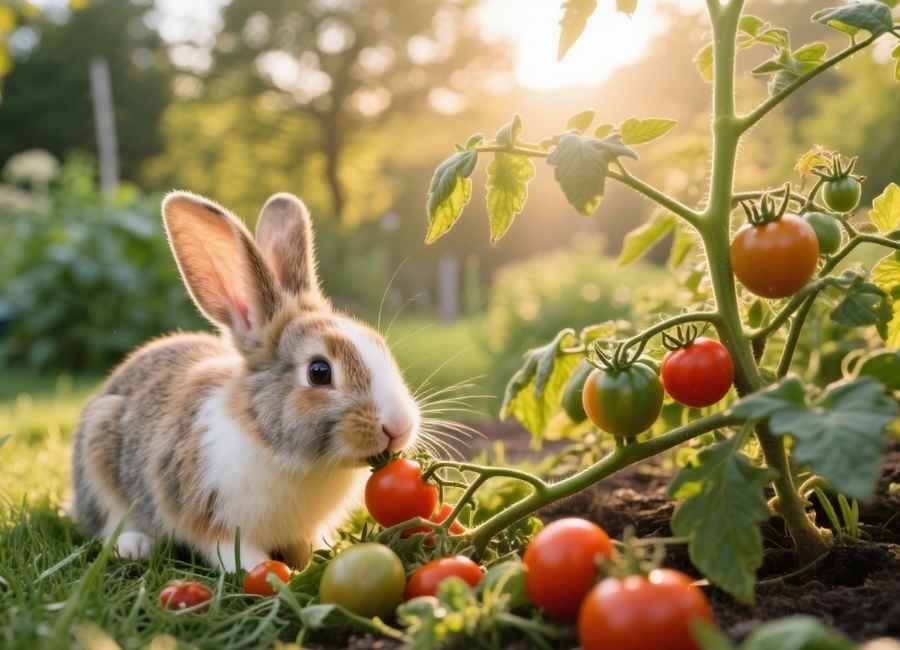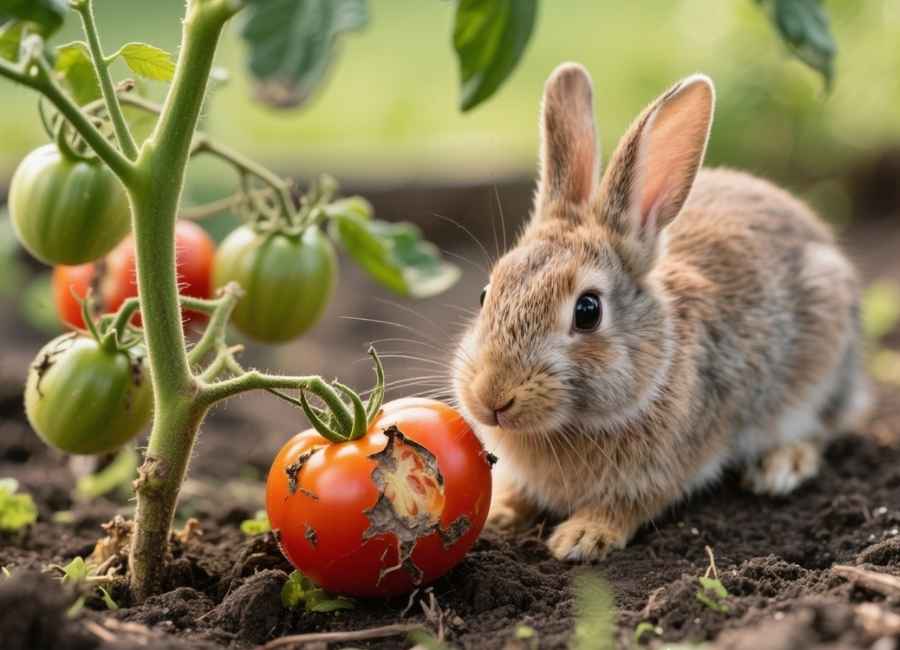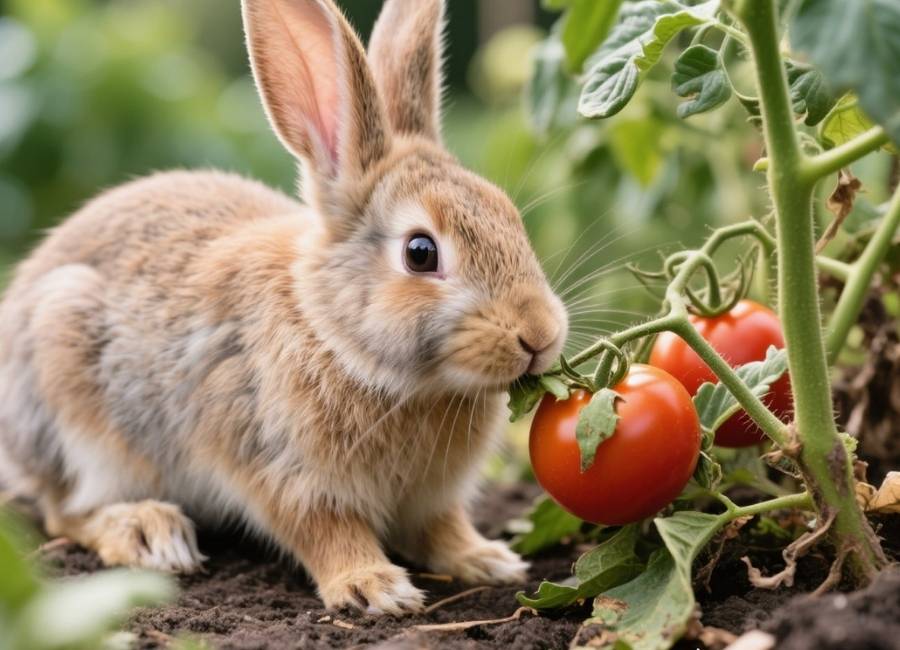Rabbits are often described as cute, fluffy creatures, happily hopping around gardens and parks. But for gardeners, these little critters can sometimes mean trouble. If you’ve spotted nibbled leaves, broken stems, or even decimated plants in your vegetable patch, you might be wondering, Will rabbits eat tomato plants? The answer, like many things in gardening, depends on the situation.
This blog dives deep into whether tomato plants are on the menu for rabbits, how to identify rabbit damage, and what steps you can take to protect your garden from these furry invaders.
Are Tomato Plants Tasty to Rabbits?
The short answer is yes, rabbits will eat tomato plants, but there’s more to consider.

What Part of Tomato Plants Do Rabbits Eat?
Rabbits are not picky eaters when they’re hungry. They can munch on various parts of tomato plants, including:
- Leaves – The tender, succulent leaves are often the first to be nibbled. Rabbits may start on the youngest leaves for their softer texture.
- Stems – They may gnaw on stems, leaving broken or jagged ends.
- Fruit – Though rabbits mainly seek leaves and stems, they may nibble on ripened tomatoes if they’re accessible.
Are Tomato Plants Safe for Rabbits to Eat?
This is a critical question because, while rabbits might eat tomato plants, they shouldn’t. Tomato leaves, stems, and unripe green tomatoes contain a compound called solanine, which can be harmful to rabbits in large quantities. However, rabbits tend to instinctively avoid toxic plants unless other food sources are unavailable.
Ripened red tomatoes themselves are less toxic, but if your rabbit has raided the garden, you’ll want to ensure its overall diet is balanced and safe.
How to Identify Rabbit Damage in Your Garden

If you’re wondering whether rabbits are snacking on your tomato plants, here are some telltale signs:
- Clean-Cut Damage: Rabbits have sharp teeth that leave clean, diagonal cuts on stems and leaves.
- Droppings: Small, round droppings scattered near the plants signal a rabbit’s presence.
- Tracks: Rabbit tracks are distinct, showing large hind feet and smaller front paws. Soft garden soil is a great place to spot these prints.
- Nearby Burrows: Rabbits often live close to their feeding grounds. Look for burrows or nests near your garden.
It’s key to confirm whether rabbits are the true culprits, as several other animals, such as deer, rodents, or insects, could damage your tomato plants similarly.
How to Protect Tomato Plants from Rabbits
Fortunately, there are effective ways to deter rabbits and keep your tomato plants safe:
1. Install Fencing
Fencing is one of the most reliable ways to keep rabbits away from your garden. Here’s how to do it right:
- Use chicken wire or hardware cloth with holes no larger than 1 inch.
- Ensure the fence is at least 2 feet high, as rabbits can jump surprisingly well.
- Bury the fence 6 to 12 inches into the ground to prevent rabbits from digging underneath.

2. Use Rabbit Repellents
There are commercial repellents available specifically designed to deter rabbits. Some gardeners prefer homemade solutions:
- Natural Repellents: Crushed garlic, chili powder, or vinegar sprayed around your garden edge can discourage rabbits.
- Store-Bought Options: Look for eco-friendly sprays that won’t harm your plants or local wildlife.
3. Provide Alternative Food Sources
If you don’t mind sharing your garden, planting a small “rabbit buffet” might steer them away from your prized tomatoes. Plants like lettuce, carrots, or clover are favored by rabbits and can act as a distraction.
4. Plant Rabbit-Resistant Vegetables
Including rabbit-repelling plants alongside tomatoes can create a natural barrier. Consider marigolds, onions, or rosemary. These strong-scented plants are less appealing to rabbits and can reduce their interest in your garden.
5. Create Physical Barriers for Each Plant
Individual plant barriers can add an extra layer of protection. Use cages made from chicken wire or lightweight cloches to cover each tomato plant. This is especially effective while the plants are young and more vulnerable.
6. Adopt Humane Deterrents
Devices or methods that scare rabbits away without harming them include:
- Motion-activated sprinklers
- Reflective garden tape
- Ultrasonic devices designed to deter small animals
What If You Keep Rabbits as Pets?
If you’re a pet rabbit owner with a love for gardening, you’ll need to take extra precautions. Pet rabbits should not have unsupervised access to tomato plants due to the risk of consuming toxic parts. Instead, provide them with safe, rabbit-friendly vegetables like romaine lettuce, cucumber, or kale.
Why Rabbits Love Gardens
Rabbits are creatures of habit and convenience. Your tomato plants might fall victim to rabbits if they:
- Are easy to access.
- Are surrounded by other enticing plants.
- Offer fresh, tender vegetation, especially during early growth stages.
Creating an unappealing environment for rabbits is key to keeping your garden safe without resorting to harmful measures.
Final Thoughts
While rabbits enjoy munching on tomato plants, keeping your garden safe doesn’t have to be a battle. By understanding why rabbits target certain plants and taking proactive measures like fencing, repellents, and companion planting, you can strike a balance between gardening success and wildlife harmony.
Want to learn more about protecting your garden from common pests? Subscribe to our newsletter or check out our curated list of eco-friendly gardening solutions!











